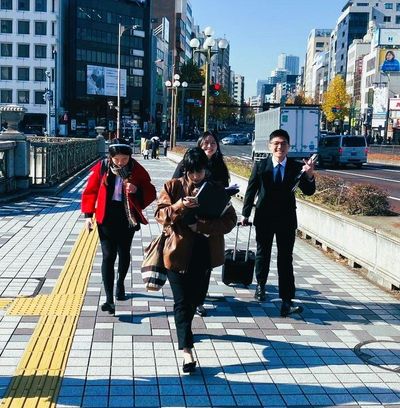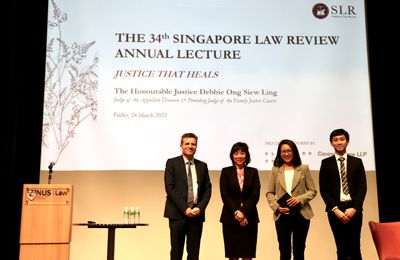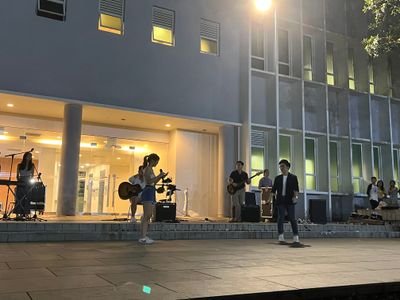As everyone busies for the start of another gruelling semester, the mooting season is picking up speed. Kicking things off is the annual Attorney General’s Cup (AG Cup). After four gruelling knockout rounds, the finalists from both NUS and SMU readied for the competition to take home the coveted trophy. This year’s iteration was held in SMU’s David Marshall Moot Court. Deputy Attorney-General Mr. Hri Kumar Nair SC, Judicial Commissioner Ms. Mavis Chionh and Justice Kannan Ramesh took time out of their hectic schedules to grace the competition.

The scenario given to the teams this year follows a jurisdictional dispute between a solid waste re-processing plant, D2, located in Dland, and its managing director D, against the public prosecutor from neighbouring country Pland. The dispute arose due to D2 corporation’s processes releasing hazardous smoke and noxious fumes into the atmosphere, which were carried by the wind over to Pland and vitiated its atmosphere.
Team NUS, consisting of Mr Wang Qi Yu and Mr Abhishek Srivastava, represented the Appellants, while Ms Carissa Low and Mr Li Zizheng represented SMU’s team in the respondent’s corner.
Starting the ball rolling was Mr Wang Qi Yu, representing D and D2. Not one to falter under pressure, he began his argument with confidence and gusto, attempting to persuade the bench that the courts were not able to claim a criminal conviction against D and D2 on grounds that both limbs of sections 278 and 108B of the Penal Code were not met. After a detailed analysing of the given facts, he extrapolated his point by bringing up several pertinent examples of similar situations to substantiate his argument.
Raising the example of the 2014 Haze situation in Singapore caused by forest fires in Indonesia, he noted that Singapore did not table any criminal charges against the Indonesian people responsible for causing the fires. Instead, Singapore merely created a new act just for the situation. Clearly impressed with his show of general knowledge, the judges also brought up the example of the Protection from Online Falsehoods and Manipulation Act (POFMA), which led to a riveting discussion between the Mr Wang and the bench.
Next, Mr Li Zizheng took to the rostrum to represent the Respondents. He immediately voiced his firm conviction that the lower court had made the right decision in convicting D and D2 corporation. He proceeded to explain that air pollution does not respect jurisdictional boundaries, and that the actus reus was the releasing of pollutants in Dland that eventually ended up in Pland, resulting in a lowering of its air quality. He was then the victim of a heavy line of questioning from the judges, especially from Judicial commissioner Mavis Chionh, who countered his point with an example of her own. She put forward a hypothetical: If a kettle farmer’s herd released potentially toxic gases into the atmosphere within his own country, would he be criminally liable? While admittedly taken aback by the novelty of the comment, Mr Li kept his composure and replied with a resounding yes, and proceeded to round off his argument.
Noting his cue, Mr Abhishek Srivastava calmly began his speech. His put forward logical and well-thought out arguments, stating that D is not liable to be charged for abetment given that he did not fulfil both the actus reus and mens reus requirements, and deftly questioned the limb of the instigation charge. While faced with slight disagreement from the bench, he did not appear to be at all affected by the pressure. Instead, he picked himself up with poise and grace, cogently supporting all of his arguments with well-informed answers that were backed by his extensive knowledge of many relevant cases, which impressed not only the audience but the judges as well.
Finally, it was time for the last speaker, Ms Carissa Low, to say her piece. Not one to be overshadowed, she embodied the phrase “saving the best for last” with a spritely display. Calling into question the abetment charge, she argued that D, as a managing director, was acting as an agent of the corporation and hence should be held responsible for its actions, arguing that if D is not convicted, he would simply commit the same actions again. When faced with the same intense line of questioning and hypotheticals put forward by the judges, she remained steadfast and held her ground, closing off the first stage of the competition.
The competition showed no signs of slowing down, with an engaging and rousing series of rebuttals put forth by all the participants. As the time came for the judges to take their leave and decide on their final verdict, it was clear to everyone present that they had a tough decision to make.
Their re-entrance into the moot court was met with an anticipative silence, and a palpable sense of tension filled the room. Deputy Attorney General Mr. Hri Kumar Nair SC duly announced the results: NUS was once again crowned AG Cup Champions. Mr Abhishek Srivastava was also awarded the Best Oralist Award. With this win, NUS had once again defended its title and continued its long streak of winning the AG Cup.

After the verdict was given, the tension seemingly evaporated, replaced with a comfortable and casual mood. The judges dropped their stern demeanours, offering kind words of encouragement and advice to all the participants, while also commending the impressive performances that all had shown in spite of their nervousness. Pointers on how to provide proper citations and knowing one’s target audience were some of wise lessons imparted to the teams. Though, given what an eye-catching and intense night it had been, it can be said that everyone’s minds were partially focused on the sumptuous buffet dinner that had been prepared outside (at least I was). And with that, this year’s edition of the AG Cup came to a satisfying close.







